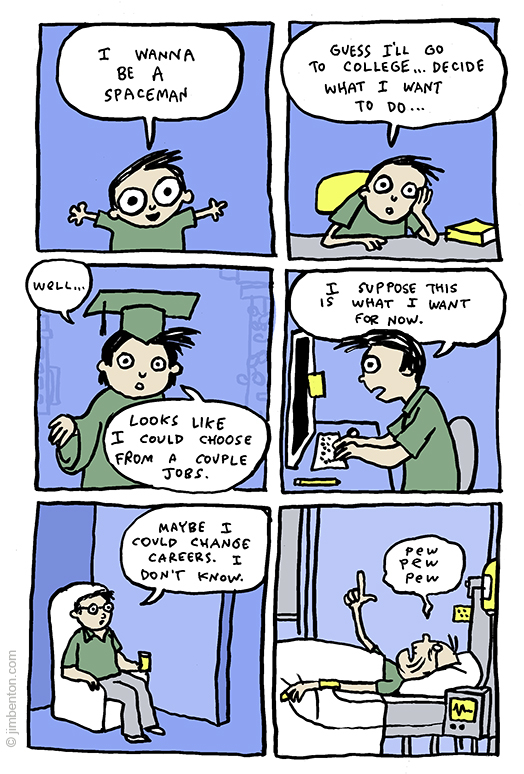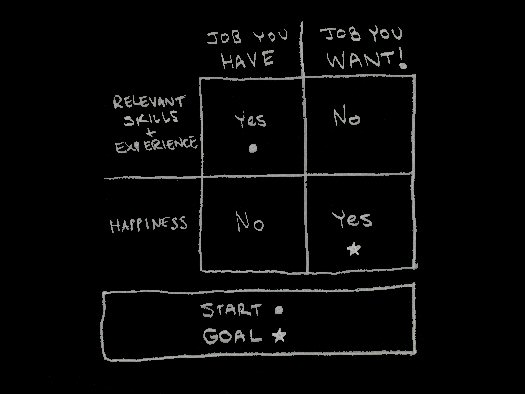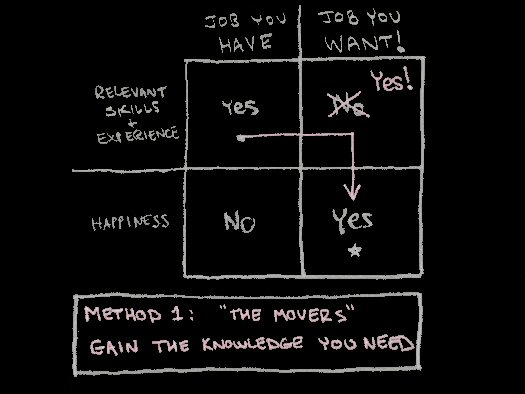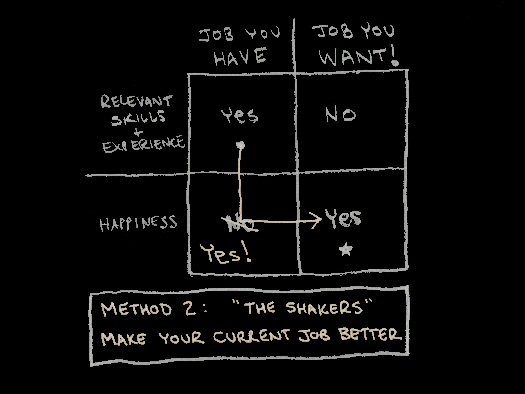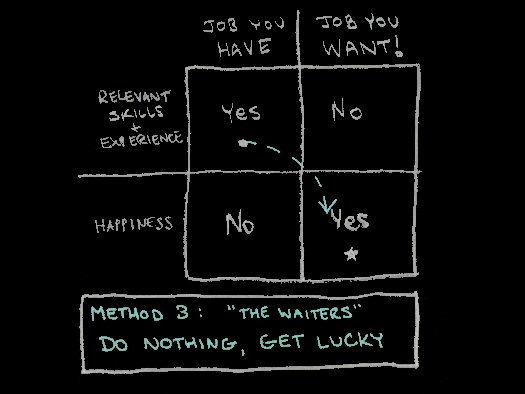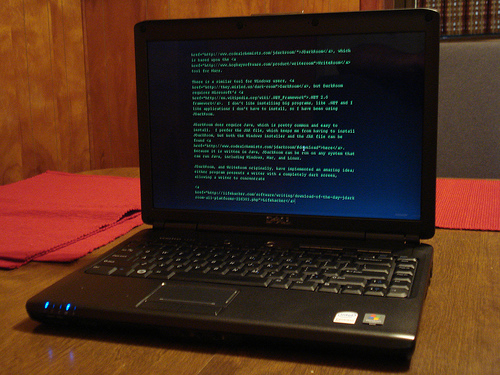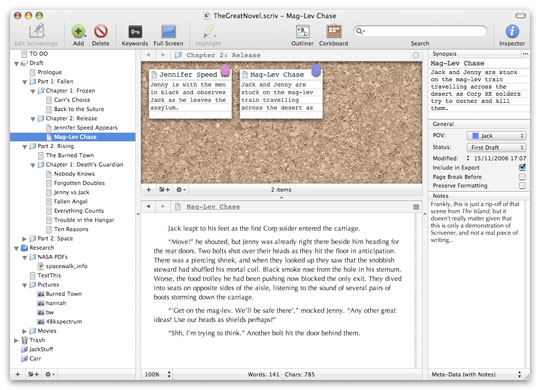There are lots of guides for how to make money online. I’m pretty sure that most of them are scams.
The reason I think this is because they all seem too good to be true. The scammer claims that through some “secret system” that they developed, they are making thousands of dollars a month doing practically nothing.
No details are revealed about the system they’re using to make money, but they do have a bunch of alleged testimonials saying “I was skeptical at first, but I bought your system and now I’m making $500 a day from home! Thanks buddy!” Additionally, there will be a bunch of stock photos of people holding cash, or walking on the beach, with captions like “Holy crap, this can be you!”

“Holy Crap I’m Awesome.”
The scammer goes on to say that you can learn all of their secrets to online wealth… Just pay $20.
But wait, a super special deal is running that just happens to end TODAY! Hurry up and place your order before the end of <today’s date> and take advantage of our 50% off discount. Just pay $10. OH MY GOD THAT’S HALF OF TWENTY!
Let’s get serious.
I’m no sucker. You know how it is when something seems “too good to be true.”
In reality, the scammers are making money online by profiting off of gullible people. Someone who spends their money on one of these scams might receive an automated email message with general tips on how to build a website, and how to earn money from it. This process is called “monetizing your website,” and information about how to do it is freely available all over the internet.
Don’t fall for these scams. Doing a little research with simple search engine phrases like “how to build a website” and “how to monetize your website” will lead you to a number of different websites that will teach you how to make money online. In fact, maybe that’s what led you to my website today.
With this in mind, let me tell you a little bit about how I’ve monetized my website. I’m going to offer you information, and do my best to prove to you that all that I’m saying is true using some pictures. Best of all, I’m not going to ask you to reach for your credit card. I’m just going to explain everything the best that I can, and you can take that info and run with it.
First things first, I will admit that I don’t make hundreds of thousands of dollars each year from my website. At the time of this writing, my website is earning a few thousand dollars a year.
How can I prove this to you?
Like I mentioned before, most sites have a single picture of some random dude walking on a beach, or a picture of a hammock strung between some palm trees, or an ocean view with a few beach chairs. Other sites have a picture of the site’s creator holding a huge check.
I don’t have a huge check. I have a bunch of little checks. Here’s an example:
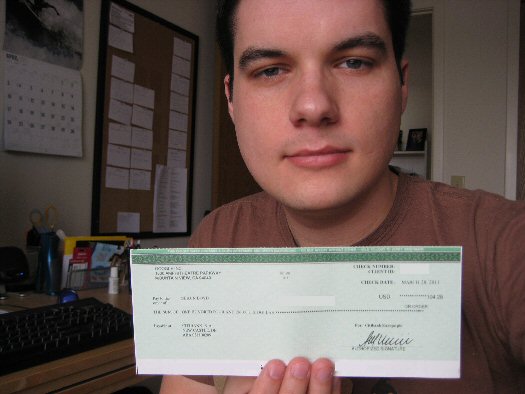
You can click the above image of me to view the full-size image, but for your convenience I’ve included a closeup of the check amount:
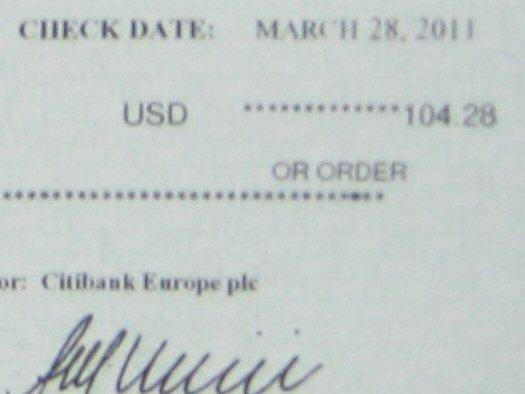
Now, allow me to be the first to admit that $100 is not a lot of money. It’s less than you can earn in a day at a full time job, and it amounts to what you might pay for your monthly cell phone bill plus a nice dinner at a fancy restaurant. This check for $104.28 isn’t meant to “wow” you.
That being said, I do receive one of these checks from Google every month. Here are a few pictures I took of myself over the course of a few months holding similar checks:
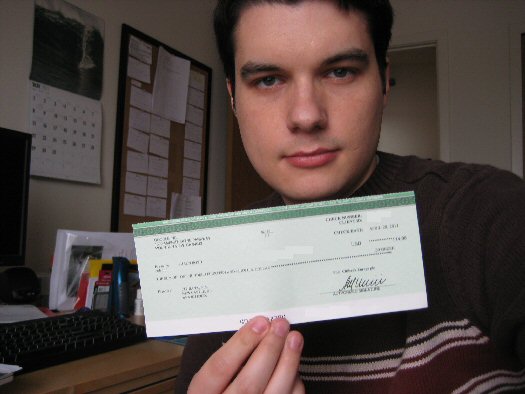
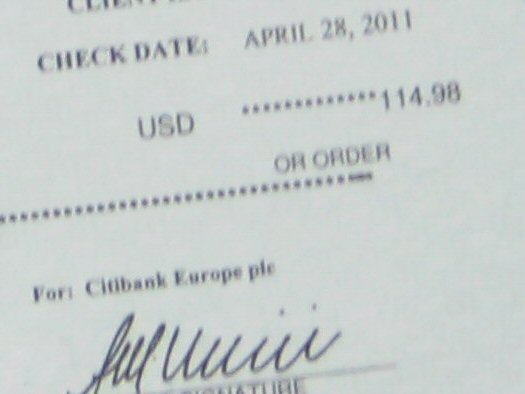
Google Adsense Payment from April 2011: $114.98
New Running Total for March – April: $219.26
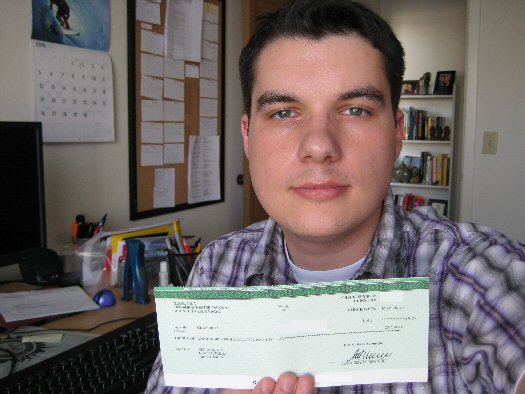
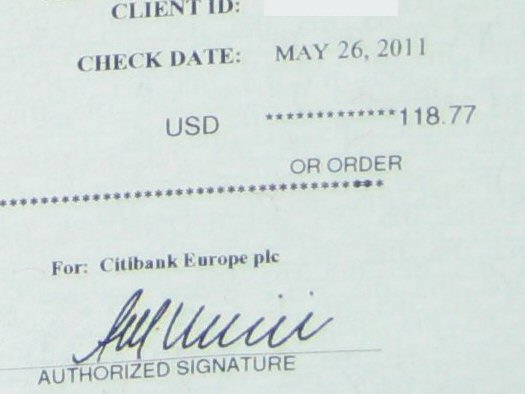
Google Adsense Payment from May 2011: $118.77
New Running Total for March – May: $338.03
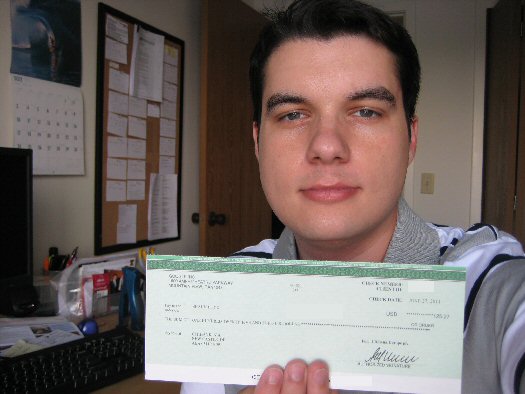
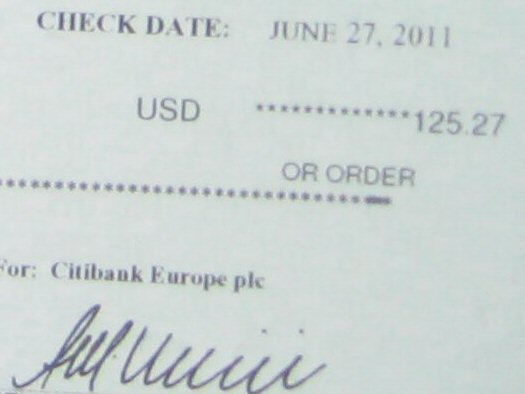
Google Adsense Payment from June 2011: $125.27
New Running Total for March – June: $463.30
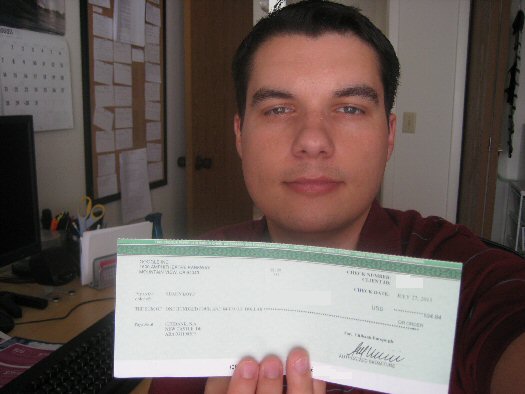
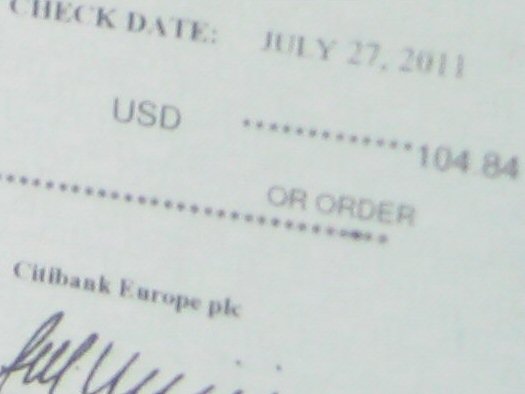
Google Adsense Payment from July 2011: $104.84
New Running Total for March – July: $568.14
I blocked out the personal information and tracking numbers in the checks, but I didn’t Photoshop any of the values to different amounts. These are all pictures of actual checks that Google sent to me for participating in their Adsense program, and the amounts are all exactly as pictured.
Once again, I admit that this isn’t a whole lot of money in the grand scheme of the world. I describe it as “extra money” because that’s what it is — money that’s supplementing my income.
What’s best about this money that I’m earning is that it is “passive income” that my website is earning automatically.
I say automatically because it’s $100 that comes to me in the mail regardless of whether I decide to work or not. Let me explain:
In March I wrote two new articles, and my site earned $104.28.
In April I wrote one new article, and my site earned $114.98.
In May I wrote ZERO new articles, and my site earned $118.77.
In June I wrote ZERO new articles, and my site earned $125.27.
In July I wrote ZERO new articles, and my site earned $104.84.
To summarize, I was able to make $568.14 online using Google Adsense, and I only “worked” for three days in those five months.
How is this possible?
The checks above are payments resulting from my Google Adsense account. The Adsense revenue is money that is being generated from advertisements posted on my website.
What’s awesome about making money online from advertisements is that I’ve created an automatic income stream that’s being generated from work that I’ve already done.
To explain a little further, I’ve been publishing articles in my blog since 2007. Everything that I’ve written is freely available on my site, but readers have to tolerate an occasional advertisement, normally at the beginning or end of something I’ve published. The advertisements are the source of my online income: the more people that view my website, the more money I make.
After four years of writing, I’ve published nearly 150 original articles, and my site now averages between 1000 and 2000 visitors every day day. A small percentage of site visitors click on ads, and the Google Adsense program tracks those clicks. The dollar amount that an advertiser is paying for these “click through ads” gets immediately added to my Adsense account with every click. Then, at the end of each month, if my Adsense account has more than $100 in it, Google sends me a check for the my total earnings.
In short, the process is: Create website, add advertisements, receive checks.
Although it really is that simple, please don’t confuse “simple” with “easy.”
Even if you have the technical know-how to create a website, and the technical know-how to add advertisements to it, there is no guarantee that you will be able to attract any visitors to your website. The amount of visitors you can successfully lead to your site will directly influence the amount of money your website will make. The amount of visitors and their corresponding statistics is commonly referred to as “site traffic.”
The larger the amount of traffic you can generate, the larger your checks will be. This is why you see “super bloggers” like Darren Rowse and Steve Pavlina who get hundreds of thousands of visitors every day making lots and lots of money online. LifeReboot is a work in progress, and although my blog earns money online, it is not yet the heavy hitter I’d like it to be.
That being said, if you are capable of earning even ONE DOLLAR online, then you are more capable than 99% of all internet users. I say this because the majority of people using the internet are simply “internet consumers.” They search and view online content, but don’t create or add any of their own. This is the average person, and this is your audience.
If you need to learn how to create a website, what a web hosting service is, or even what “copy and paste” is, then you have many things to learn. Recognize that needing to learn how to do these things to get started is perfectly normal.
When I first started, my goal was to make $1/day in my first month. I would get seriously excited over a single visitor that clicked an ad that made me 10 cents… Like everyone else that wants to create a website that earns them money, you will have to start at the starting line. Know that when you first start out, you’ll be earning nothing — at least for a little while.
If you have a website, and are ready to add Google Adsense advertisements to it, you can sign up for an account at www.google.com/adsense. The way this works is that your site must be approved by Google for their Adsense program. I don’t remember all of the specific details, but to be approved your site can’t have any trickery (no scams), it can’t contain pornography, and you can’t tell your audience directly to click the advertisements.
Once Google approves your site, they will need to verify your account by confirming your address. This process may have changed since I first did it in 2007, but they sent a postcard to my home that had a special web address and confirmation code on it. I had to type the code on the postcard into a verification box online so Google knew my home address was legitimate.
After your account is verified, you can create “ad blocks” to use on your site. An ad block is a designated space where advertisements from different advertisers will appear. When creating ad blocks you can select certain preferences like width and height of the ad blocks you’re using, and you can customize their style using different fonts and colors. There is a limit to the number of ad blocks you can add to a single page (3 ad units, and 1 text link unit).
Initially, the ads displayed in your ad blocks will be extremely generic. Google will eventually adjust the advertisements on your site so that more relevant ads are shown, but it will take some time for their system to understand what your website is about. For example, since this article is about making money online, any ads on this page will likely link to other sites discussing how to make money online.
With your ads in place, you can start to monitor your site’s daily earnings. Here are a few images taken from my Adsense account interface, and the spreadsheet report from the time period I’ve been showing to you. You’ll notice that some of the earnings values for the months match the numbers from my checks in the images shown previously.
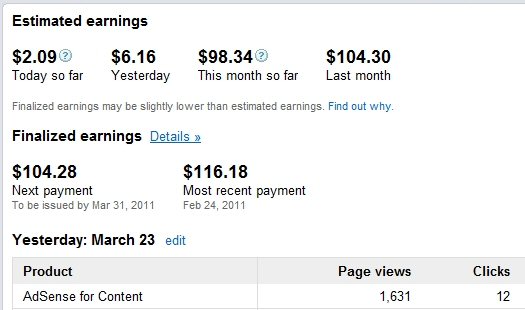
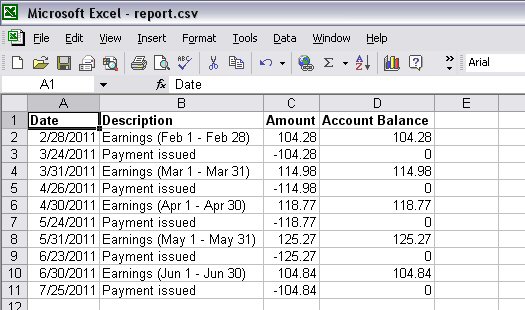
Once again, this is money that is being sent to me each month whether I write new content in my blog or not. It’s interesting that even if I don’t publish anything new, articles that I’ve previously written will still attract enough site traffic to earn a $100 check from Google.
With this in mind, I really should publish new content more often so that my blog will attract more readers. Seriously, if I can automatically earn $100 a month without writing anything, then if I were to focus on writing new content often, who is to say that I couldn’t earn $1000 a month? As I mentioned before, this blog is a work in progress, and I hope to get there someday.
So, at this point you may be overwhelmed with the amount of work you have ahead of you, or you may be enthusiastic about the prospect of making money online using Adsense. I will let you know that Adsense is not the only income stream I use on my site. There are also donations from generous readers, and I use a Paypal account for this. Paypal also lets me accept transactions from direct advertisers, who often contact me to add text links or sponsored image advertisements that appears on specific LifeReboot pages.
If you are serious about making money online, then I encourage you to investigate the many different options for monetizing your website. Personally, I prefer the non-intrusive options like Adsense and Paypal, because I want to treat my readers with respect (allowing them to read articles without forcing them to deal with ads that pop-up, or are similarly annoying). Although there are many other programs similar to Adsense that allow you to earn money through online advertisements, I can’t speak to how they work or how successful they are.
As a final note, I want to mention that there was a period of time where I had only a small, out-of-the-way advertisement in one of my site’s navigation bars. My site earned diddlysquat with this tiny advertisement. If you’re serious about making money online, and want to do it using ads on your website, then REALLY put ads on your website — don’t just hide a small one somewhere and pray for clicks.
My original line of thinking was to put ads somewhere unobtrusive so that I wouldn’t annoy my audience, but later I learned that it’s smarter to publish new content without ads at all. As I create and publish new content, my older articles get pushed back into the content archives. I will then go back and edit the older articles to include ads. This way none of my subscribers or constant readers get aggravated by ad placement, but anyone visiting my site from a link or a search engine becomes a greater source of ad revenue.
Thanks for listening. I hope the entrepreneur in you is feeling inspired, and that you’ll soon be putting your plan to make money online into action. I also hope that everything I’ve written is helpful and clear. Let me know if there’s anything that you need me to elaborate on, or if you have any questions!
Edit 9-30-11: After publishing this article, my Google Adsense earnings have increased! Here is my new monthly Adsense check “High Score” which is over $250!
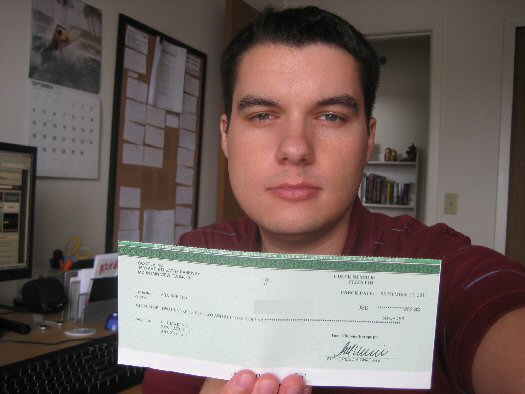
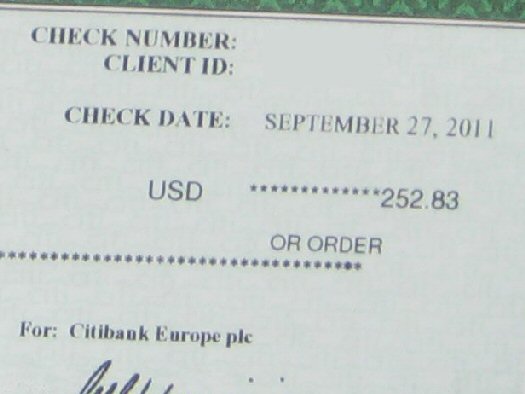
If you liked this article, you may also want to check out my series on earning income online, where I explain what I did to start generating money automatically from my website.
13 Comments »



